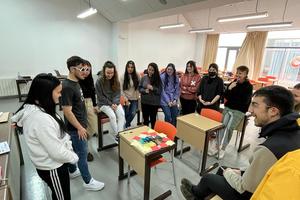Expanding the postcards beyond generations

During the 2021/2022 school year, the Palencia Faculty of Education (Valladolid University) developed, as part of the BEST project, a community experience in a triangular format, between this Faculty, the Palencia Popular University (school for adults) and a penitentiary institution, also in the same location.
The main idea was expanding the postcards activity involving the college students, elder people and a vulnerable community, inmates of a prison in this case. Though there were more people taking part on the groups, there were 30 people participating in the principal exchanges: 6 students of 2nd year of the Degree in Social Education that joined with 12 students from a school for adults, that got in contact with 8 inmates of a prison and their educator by sending the BEST postcards.
The group of university students was the one deciding to work with adults (elder people) and also inmates in this activity. Marta e Irene, two of the youngers, shared their thoughts at the end of the project:
In the end, it is about getting to know the different opinions we have and how, between different groups, we can come to have things in common that perhaps we had not even imagined at the beginning and that, even if we do not share many things, we can listen to each other and understand each other, they referred.
The students went to an adult education school to replicate the image analysis and postcard writing workshop. Then, their postcards were sent to the prison. A second group of students moved there to work the activity with a group of men deprived of liberty. They responded to the postcards sent to them from the adult school.
Some of the elder students described their experience this way:
I think that young people may be interested in being in contact with older people, to see how they think, because in the future they may have to work with these older people. And then, being with people deprived of liberty is very important because they are also part of this society and I believe that they have an obligation to be part of each project that is done.
After each group did the activity separately, a global meeting was held with students from the university, students from the adult school and prisoners, in which they all shared their views on issues of solidarity and fraternity. One of the adult school attendants summed up the experience by focusing on empathy:
well, this was to empathize, to have respect, to have trust. Yes, that is what it means for us. And in the classroom, well, all of this is shared because any sharing that is done is shared between all of us and made with the commitment of, in addition, that respect without looking at whether one is right-wing or left-wing or whether one is of one religion and the other of another. What we were
doing with the prisoners of the jail was totally enriching.
Regarding their work together with the young students, another participant expressed this way:
we have learned to listen, to listen to young people, and to understand them in the difficulties they have being so young. Despite the generational differences we have, we are able to speak and dialogue because we believe that it is the only way.
Marta and Irene absolutely agreed and decided to share this emotion as a surprise:
well, what has surprised us the most is that there are not as many differences as we thought, both at intergenerational level and with people deprived of their liberty, who after all, as we repeat so often, we are all the same. We may have some different opinions on some specific issues but there are far fewer differences than we thought.